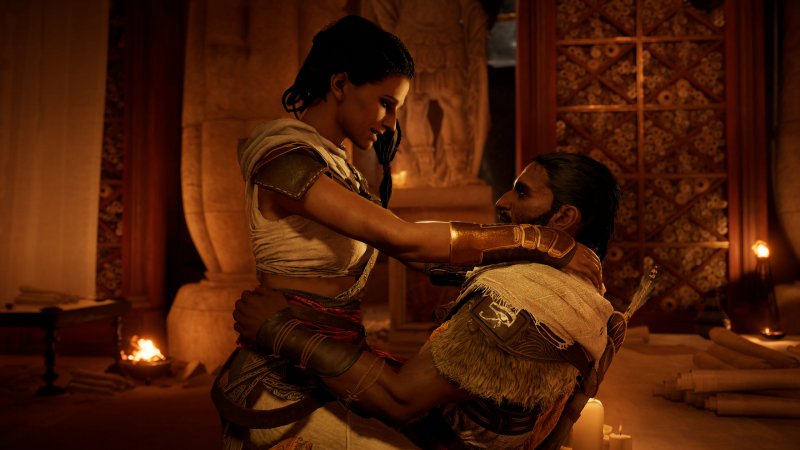The combat system has changed, in philosophy and even in the mapping of commands; exploration is different, now much more valued and “adventurous” in its continuous discoveries; there are so many elements that derive undoubtedly from The Witcher 3: Wild Hunt and that make the experience exciting, dense, multifaceted. It so happens that the show that previously went to look at the top of the towers was brought to the ground, at man’s height,
found in the diurnal landscapes that alternate gold and blue hues, in the rays of sunlight filtering through dense vegetation and refracting on the surface of the water, in the chiseled details on the floors and columns, but also in the flames that illuminate a nocturnal phase freely callable,
along the lines of the last Metal Gear Solid. So we find ourselves faced with a title that perfectly embodies the ambitions of Ubisoft? No, but it is close enough and undoubtedly lays the foundation for a bright future, denying the predictions of who two years ago spoke of a franchise inevitably destined to decline.
And so, after analyzing the PlayStation 4 and Xbox One versions of Assassin’s Creed Origins and having dedicated an in-depth look at the performance of the game on Xbox One X, here we are as usual to talk about the PC version.
HOW I WOULD LIKE TO LIVE IN EGYPT
The Assassin’s Creed series undoubtedly has the merit of having stimulated a certain degree of enthusiasm around tourism related to the settings of the various chapters, and Origins is no exception, although most of the evocative views visible in the game are the result of a mere reconstruction , however fascinating and elaborate, given that certain places no longer exist or have completely changed their faces over the centuries.
This does not mean that visually the spectacle offered by this new production is extraordinary, as mentioned an alternation of gold and blue that in fact continues the path begun by the development team with Black Flag and enriches it from every point of view.
The water is the same, beautiful, that we had appreciated in the role of Edward Kenway, while the huge desertic plains exploring on horseback recall the adventurous and sometimes unpredictable (at least in Patrice Desilets’s intentions ) of the first Assassin’s Creed.
A tribute perhaps wanted, which somehow highlights how this episode has returned with the feet on the ground from the point of view of gameplay, ready to surprise us in less canonical and inflated ways than what we had been accustomed over the years.
Curiously there is a bit ‘of Altair even in the fighting, as said revolutionized in the approach and commands: in sharp contrast with the figure of the Assassin as unstoppable war machine, capable of ringing dozens of killings and leave on their way a trail of corpses,
Assassin’s Creed Origins proves very concrete in telling us that no, that particular quest requires a higher level of experience and try to carry it out equally could easily lead us to defeat once faced with more tough opponents, crafty and better equipped than us.
Promises that in the long run lose consistency and are not kept to the end, it is true, but in any case strong symbols of a renewal in the facts, not only in words.
The new skill tree is very interesting in this sense, but above all the RPG vision that characterizes weapons and armor, no longer boundary elements but protagonists of a more varied and full-bodied combat system, although at times it is not very refined.
Aspects of the experience that establish a solid framework, not exempt from structural repetitions but certainly able to entertain for tens of hours, assisted by an engaging narration and intelligently projected to the future.

